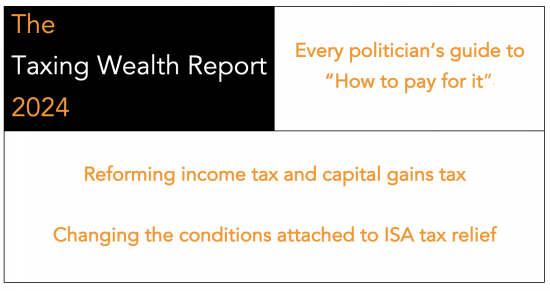I have this morning published the latest note in my series that will make up the Taxing Wealth Report 2024. This latest note deals with problems that ISAs create within the UK economy.
At present, we spend £3.7 billion over annum (or most likely, more by now) subsidising ISAs when the resulting savings are either left as moribund, economically dead money, in cash savings accounts or are used for financial speculation in the City of London. Neither creates any new investment in the UK. Neither provides a return to the Exchequer for the subsidy given, which goes mainly to the wealthy and elderly population of this country.
As a result, this note proposes a radical transformation of the use of ISAs so that they become a major source of the new financial capital required to create the transformed society that the people of this country deserve to live in.

The summary of this note says:
Brief Summary
This note proposes that existing ISA savings arrangements should be scrapped because they provide almost no overall economic return to the country as a whole, very largely subsidise the savings of the already wealthy, and divert funds away from much more constructive use.
Green ISAs are proposed in place of existing ISA savings arrangements. These Green ISAs would have to be invested in either government-backed savings accounts or bonds or private sector equivalent accounts, all of which funds would be required to invest the proceeds of sums raised in:
- The transition to net zero that this country requires.
- Social infrastructure, such as new housing.
- Related activities such as education, training and appropriate support services.
The option of simply leaving cash in moribund bank accounts or of speculating funds on stock markets, which is how the £700 billion or more now saved in ISA accounts is currently used, would disappear over time as existing ISA account arrangements expired and new ones took their place. £70 billion a year goes into ISA accounts at present, the main appeal being their tax-free status.
The creation of a new source of capital for public investment from this source would, as a result, turn the current £3.7 billion (and rising) annual cost of subsidising such accounts from being lost money into a valuable source of funding for new investments that would in themselves generate new taxation revenues. At the very least, the entire cost of the tax subsidy for these accounts would be saved by the tax paid on that new investment (with the actual sum generated likely to be very much higher). As such, it is suggested that at least £3.7 billion of tax cost will be saved a year as a result of these changes.
Discussion
There are good reasons for questioning the economic value of ISA savings arrangements to the UK government, and quite possibly to the UK population as a whole.
Approximately half the sums saved in ISAs are held in cash based accounts, with the proportion changing slightly over time. Cash based saving was rarely rational during much of the period covered by the HMRC data noted above because of the low rates of interest paid on sums deposited, and yet very large sums were saved in that way, largely because of the inherently cautious nature of most savers. There is no criticism implied here with regard to that behaviour: each saver should be able to determine their own risk profile.
There was, overall, likely to have been a higher rate of return to those who saved in equity shareholdings over this period, but that said the return in question might have been very volatile, and unstable. Not everyone will necessarily benefit by saving in this way.
More importantly, from a macroeconomic perspective, neither of these savings mechanisms adds any significant value to the UK economy. Cash held on deposit does at a macroeconomic level represent money withdrawn from circulation within the economy as a whole, and as such has a deflationary effect on overall economic activity. Few would suggest that this was of economic benefit during the course of the period since 2010 when austerity was already prevalent and growth was low.
In addition, and as is little appreciated, cash deposits do not in any way fund the lending made by the banks with which the sums are deposited. This fact was acknowledged by the Bank of England[1] in 2014. As they noted, at that time, loans made by commercial banks are the result of new money creation. Cash deposits made by one person are never loaned to another customer of a bank. As a consequence, cash deposits are, in effect, dead money within the economy, which is one reason why banks are so reluctant to pass on interest payments to depositors. Cash deposits do not add value to banks and so they are unsurprisingly reluctant to pay for them. What this does, however, mean is that these deposit add almost no value to the UK economy, and to subsidise them does, in that case, makes little sense.
There is little reason to suggest that equity share investments made through ISA accounts provide any more economic benefit for the UK as a whole. The vast majority of shares held in ISAs will be held through managed investment funds, most of which will track the performance of large share indices. These funds rarely purchase new shares issued by the companies in which they invest, largely because quoted companies very rarely rely upon this source of finance now. In fact, those companies are usually more intent on repaying their share capital than they ever are on increasing it.
In that case, what this means is that the funds that are held within ISA saving arrangements very rarely, if ever, result in the investment of new funds in new economic activity within the UK economy. They are instead used for speculative, but not investment, purposes. The result is that these savings, just like cash deposits, add almost no value to the UK economy as a whole either by promoting employment or by creating new investment in the productive economy.
Taking these combined observations into account it is apparent that a review of the savings arrangements represented by ISA accounts would now be appropriate. This is most especially the case when it is known that significant new capital is required within the UK economy to fund the climate transition, new social housing and other infrastructure investment.
The changes to ISAs proposed in this note address these issues with existing ISAs and turn ISAs from being a drain on the UK economy into a source of new capital for its transformation.
Cumulative value of recommendations made
The recommendations now made as part of the Taxing Wealth Report 2024 would, taking this latest proposal into account, raise total additional tax revenues of approximately £115.1 billion per annum.
Footnotes
[1] https://www.bankofengland.co.uk/quarterly-bulletin/2014/q1/money-creation-in-the-modern-economy





